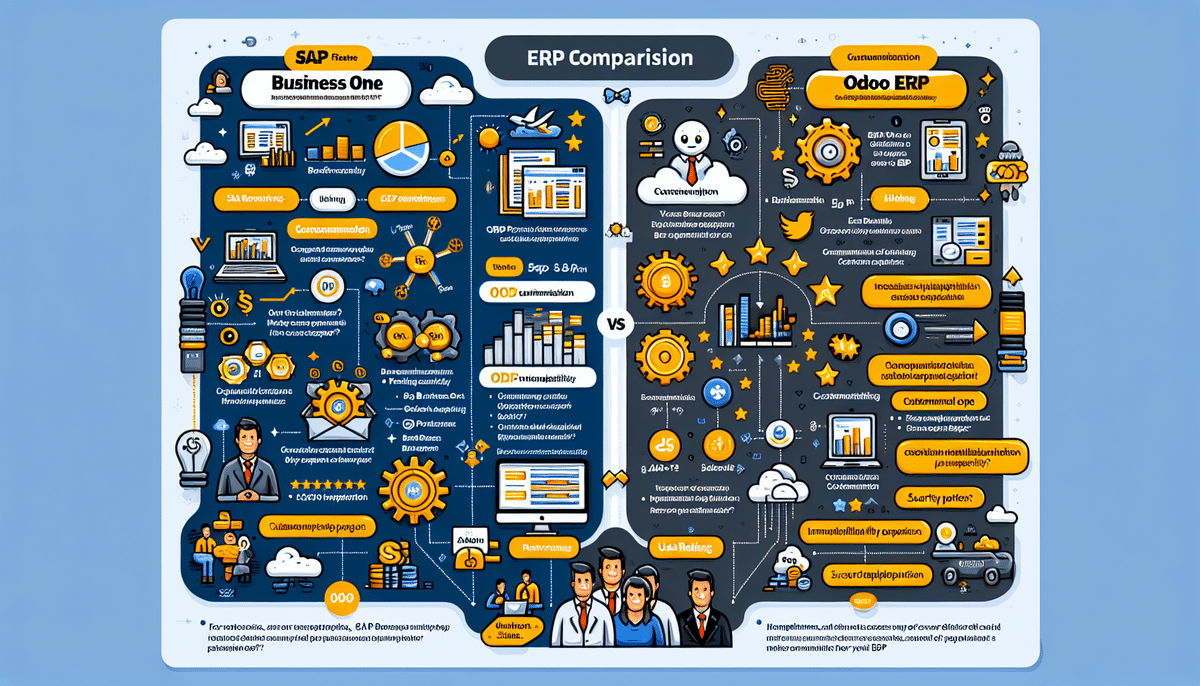Introduction to Enterprise Resource Planning (ERP) Software
Enterprise Resource Planning (ERP) software is essential for integrating data and processes across an entire organization. By managing core operations—including finance, procurement, supply chain, human resources, and customer relationship management—ERP systems help businesses enhance efficiency, reduce costs, and make informed decisions based on real-time information. This comprehensive solution is utilized by businesses of all sizes, from small startups to large multinational corporations.
One of the primary advantages of ERP software is automation. Tasks that were once performed manually can now be automated, allowing employees to focus on more strategic activities. Additionally, centralized customer information enhances customer service by enabling quick and personalized interactions.
ERP systems also provide businesses with real-time data and analytics, allowing them to respond swiftly to market changes and maintain a competitive edge. By identifying areas for operational improvement, ERP software helps organizations optimize processes and reduce expenses.
Overview of SAP Business One and Odoo ERP
SAP Business One and Odoo ERP are two leading ERP solutions tailored to meet the diverse needs of businesses. SAP Business One is primarily designed for mid-sized businesses, offering robust features and extensive support. In contrast, Odoo ERP caters to both small and large enterprises with its flexible, open-source platform.
A significant difference between the two lies in their pricing models. SAP Business One involves a considerable upfront investment along with ongoing maintenance and support fees. Conversely, Odoo ERP provides a more flexible pricing structure, offering both on-premise and cloud-based deployments with various subscription plans to accommodate different business sizes and budgets.
Key Features and Benefits
Features of SAP Business One
- Real-time information and analytics for informed decision-making
- Integrated financial and accounting management
- Inventory and production management to optimize supply chains
- Advanced customer relationship management (CRM) tools
- Customizable reporting and dashboards
SAP Business One helps businesses reduce costs, increase efficiency, and enhance customer satisfaction. Additionally, its mobile application allows users to access real-time data and perform tasks on the go, supporting both iOS and Android devices.
Features of Odoo ERP
- Customizable, modular design for flexibility
- Integrated business processes across departments
- Real-time analytics and reporting
- CRM and email marketing tools to boost sales
- Inventory and warehouse management for efficient supply chain management
Odoo ERP stands out for its adaptability, allowing businesses to tailor the system to their unique needs. Its modular design ensures that companies can select only the features they require, making it a cost-effective solution for small businesses. The user-friendly interface and cloud-based deployment option further enhance its appeal, facilitating remote access and collaboration.
Pricing Comparison
When comparing pricing, SAP Business One and Odoo ERP offer distinct approaches. SAP Business One provides both perpetual licensing and subscription-based pricing models, with costs varying based on deployment options. Odoo ERP, on the other hand, follows a subscription-based model where costs depend on the number of users and selected modules.
Generally, Odoo ERP is more cost-effective for small businesses, while SAP Business One is better suited for mid-sized organizations that require extensive functionality and customization. It's important to consider not only the initial costs but also the long-term expenses related to support, training, and potential scalability.
For detailed pricing information, refer to the official pricing pages:
Integration and Customization Capabilities
Integration Capabilities
Integration with other software systems is crucial for maximizing the utility of ERP solutions.
SAP Business One Integration
- Seamless integration with CRM, e-commerce, and supply chain management systems
- Compatibility with third-party applications, including Microsoft Office and other business tools
- Open APIs for custom integrations
SAP Business One offers comprehensive integration options, facilitating smooth data exchange across various business management systems. This makes it an excellent choice for organizations requiring interconnected software solutions.
Odoo ERP Integration
- Integrations with popular e-commerce platforms like Shopify and WooCommerce
- Connections with shipping providers, accounting software, and other business tools
- Robust API for custom integrations
Odoo ERP's open-source nature allows for extensive customization and integration with a wide range of third-party applications, providing businesses with the flexibility to create a tailored software ecosystem.
Customization Options
SAP Business One Customization
- Add custom fields and objects to data tables
- Customize user interfaces and workflows
- Modify standard reports and dashboards
These customization options enable businesses to adapt SAP Business One to their specific operational needs, ensuring that the ERP system aligns perfectly with their unique processes.
Odoo ERP Customization
- Create custom modules and applications
- Modify user interfaces and workflows
- Add custom fields to existing modules
Odoo ERP's modular architecture allows businesses to develop custom modules and applications, making it highly adaptable to diverse business requirements.
User Experience and Support
Ease of Use
SAP Business One
SAP Business One features a user-friendly interface designed to provide a unified view of all business aspects. Its intuitive design helps users manage operations efficiently, supported by comprehensive training and resources to maximize the software's potential.
Odoo ERP
Odoo ERP offers a clean and modern interface that is easy to navigate. Its intuitive design, combined with extensive customization options, allows businesses to tailor the system to their specific needs. Odoo also provides detailed documentation and community support to assist users in leveraging the platform effectively.
Customer Support
Both SAP Business One and Odoo ERP provide robust customer support, including access to extensive knowledge bases, training materials, and helpdesk services.
- SAP Business One: Offers a dedicated customer portal, product support specialists, and an extensive partner network for implementation and support.
- Odoo ERP: Provides community support, professional services, and a variety of support plans to cater to different business needs.
Choosing between them depends on the level of personalized support and resources your business requires.
Security Features
Security is paramount in ERP systems to protect sensitive business data.
- Both SAP Business One and Odoo ERP offer data encryption, access controls, and regular software updates to safeguard information.
- SAP Business One: Includes advanced security features such as role-based security and auditing tools, which help businesses comply with regulatory requirements.
- Odoo ERP: Provides robust security measures, including SSL encryption and two-factor authentication, ensuring data protection and system integrity.
When selecting an ERP system, it's crucial to evaluate the security features to ensure they align with your organization's compliance and data protection standards.
User Reviews and Ratings
Both SAP Business One and Odoo ERP have garnered positive feedback from users.
- SAP Business One: Users appreciate its comprehensive features and reliable support, making it a trusted choice for mid-sized businesses.
- Odoo ERP: Praised for its flexibility and customization options, Odoo is favored by businesses seeking a tailored ERP solution.
For detailed user reviews and ratings, visit reputable review platforms such as G2 and Capterra.
Implementation Process
Implementing an ERP system can be complex and time-consuming.
- SAP Business One: Offers a structured implementation process with various resources to assist businesses in streamlining the deployment. Their extensive partner network provides additional support for seamless integration.
- Odoo ERP: As an open-source platform, Odoo may require technical expertise for installation and customization. However, Odoo provides implementation services for an additional fee, and its modular design allows businesses to start with essential features and expand as needed.
Choosing the right implementation approach is critical to ensuring a smooth transition and maximizing the ERP system's benefits.
Conclusion: Choosing the Best ERP for Your Business
Deciding between SAP Business One and Odoo ERP depends on your business's specific needs and budget.
- SAP Business One: Ideal for mid-sized businesses that require extensive support, robust security features, and comprehensive functionality.
- Odoo ERP: Perfect for small to large businesses seeking a flexible, customizable, and cost-effective ERP solution.
Both ERP systems offer a wide range of features and benefits that can help businesses improve operations, increase efficiency, and maintain a competitive edge. Assess your organization's requirements carefully to select the ERP system that best aligns with your strategic goals.




















